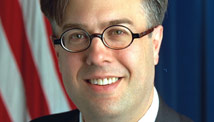Going from Voodoo to vaccines

- Pneumonia and diarrhea kill millions of young children in the developing world each year
- Vaccinations are inexpensive, but some nations resist using them, says Michael Gerson
- The documentary "Voodoo and Vaccines" looks at resistance in the African country of Benin
- Gerson: Funding the distribution of vaccines saves lives and helps those fighting for progress
Editor's note: Michael Gerson, a nationally syndicated columnist, was head of speechwriting and a policy adviser for President George W. Bush. He is the author of "Heroic Conservatism" (HarperOne, 2007) and a co-author of "City of Man: Religion and Politics in a New Era" (Moody, 2010). Gerson serves as senior adviser at ONE, a bipartisan organization dedicated to the fight against extreme poverty and preventable disease.
(CNN) -- Each year millions of children under the age of 5 in the developing world die of pneumonia and diarrhea. The vaccines to prevent deaths from these diseases do not need to be invented -- they already exist.
It costs just a few dollars to vaccinate against pneumococcus and rotavirus. It is arguably the most cost-effective health intervention in the world -- a prick of the needle, a cry, and then a lifetime of protection.
But even when a cause is simple, cultures and human beings are not. A documentary has the potential not only to make an argument but to reveal a way of life. By focusing on the country of Benin, "Voodoo and Vaccines" provides a window to a different world. It reveals the complex cultural obstacles to vaccination, while introducing us to a group of extraordinary men and women working to overcome those obstacles.
Western perceptions of Africa can be one-dimensional -- determined by images of war and safari parks. "Voodoo and Vaccines" takes us to a real place of dirt roads, of crowded hospital wards and of people with powerful traditions and mystic beliefs. The streets are filled with life and motorbikes. The sky is filled with spirits. The depiction is authentic and unsentimental. The film discloses rather than judges.
See the rest of "Voodoo and Vaccines" at VBS.TV
The role of religion in any society is difficult for outsiders to fully understand. In Africa, Voodoo is practiced in several countries, such as Benin, Togo and parts of Nigeria. Voodoo healers in Benin are the bearers of tradition, which makes some of them suspicious of modern ideas and technology, including vaccination.

They sometimes assert that vaccines result in disease -- a destructive belief not unknown in the developed world. Traditional religion can be an obstacle to modern medicine.
Yet traditional healers are some of the most respected members of the community. For Voodoo believers, they bridge the realms of past and future. In the words of the Voodoo priest Dah Aligbonon in the film, they bring healing with "tears from the moon." Their standing and authority are considerable. Their opinions matter greatly.
"Voodoo and Vaccines" shows how government and health officials have reached out to religious leaders, and how many traditional healers are now carrying a pro-vaccination message. They are combining a belief in traditional medicine with an acceptance of modern medicine. And this is benefiting the people of Benin.
In the process of telling this story, the documentary highlights some exceptional people -- nurses, doctors, community health workers -- whose life's work is the health of children. Amid great challenges, according to the film, "there are people who are fighting." They care for children throughout their early childhoods -- the time of greatest health danger. And their most effective, important tool is vaccines.
Many diseases have already been confronted and defeated by the broad distribution of vaccines. But a few illnesses -- particularly pneumonia and diarrhea -- still take many lives. The death of a child is always tragic. These deaths are also unnecessary.
When Americans and others fund the distribution of vaccines in the developing world, they are not only helping children. They are taking the side of good people working for the health and future of their country. We are not just helping the sick; we are joining with partners who are willing to perform the hardest tasks. We should be honored to be allied with them.
But now they are waiting -- waiting for the vaccines that could save the lives of children at minimal cost. They should wait no longer.
Take a few minutes to view this film, to visit a place you have probably not seen before, and to consider a hopeful cause that needs your voice.
The opinions expressed in this commentary are solely those of Michael Gerson.

